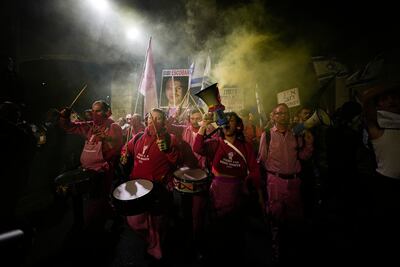Israel's parliament has passed the first reading of a bill that would allow the government to override Supreme Court challenges to laws, a power that opposition leaders say is a fatal blow to the country's democracy.
The measure is the centrepiece proposal of a seismic package of judicial reforms that the new government led by Prime Minister Benjamin Netanyahu has put at the core of its policy agenda, arguing that the courts have too much power and an anti-right wing bias.
Opposition parties mounted a strong campaign against it, including an hours-long filibuster after which the parliament was only cleared at 3am on Tuesday.
Leader of the Yisrael Beytenu party Avigdor Liberman said “this is another step by this insane government that is leading to a deep rift in the nation of Israel”.
Earlier in the day, major opposition leaders vowed to boycott the final round of voting on the judicial reforms.
President Isaac Herzog, who has expressed mounting disquiet over the proposals in recent weeks, described the situation as “very serious” on Monday.

On Saturday, he issued an unusually stark warning, saying that the legislation was “oppressive” and that it was leading the country to “disaster”.
On Monday the coalition also made progress on steps to make it harder for legal institutions to force a prime minister to step down, by advancing a bill that would prevent the high court from being able to do so, except on grounds of physical or mental incapacity.
Opponents of the bill view it as a way of protecting Mr Netanyahu from an ongoing corruption trial.
Israel has been hit by increasingly confrontational protests for 10 consecutive weeks over the government’s legal plans, which have plunged the country into division and politicised institutions.
Reports emerged in Israeli media on Monday that the head of Israel’s police urged colleagues not to be in contact with far-right National Security Minister Itamar Ben-Gvir, who is pressing for a harsher response to protests that recently have seen demonstrators strike and block motorways and the country’s main airport.
Mr Ben-Gvir has labelled protesters as “anarchists” and has criticised the police for a lax response despite instances of forces using water cannons and stun grenades to control crowds, injuring demonstrators.
Organisers said that last Saturday saw the largest mass action in Israeli history, numbering 500,000 people who turned out across the country to protest against the judicial reforms.
On Tuesday, the parliament also passed the first round of voting on a bill to repeal a 2005 law that led to the emptying of four West Bank settlements and banning Israelis from living in a northern region of the area, in a major win for the administration as it seeks to legitimise illegal settlement activity.


